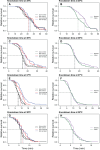Cross-tolerance evolution is driven by selection on heat tolerance in Drosophila subobscura
- PMID: 40746616
- PMCID: PMC12312690
- DOI: 10.7717/peerj.19743
Cross-tolerance evolution is driven by selection on heat tolerance in Drosophila subobscura
Abstract
The evolution of heat tolerance is crucial for the adaptive response to global warming. However, it depends on the genetic variation present in populations and the intensity of thermal stress in nature. Experimental selection studies have provided valuable insights into the evolution of heat tolerance. However, the impact of the heat stress intensity on the correlated changes in resistance traits under selection of heat tolerance has not yet been explored. In this study, the correlated response of increasing knockdown temperature in Drosophila subobscura was evaluated on the knockdown time at different stressful temperatures, the thermal death time (TDT) curves, and the desiccation and starvation resistance. Selection for increased heat tolerance was conducted using different ramping temperatures to compare the effect of heat intensity selection on resistance traits. An evolutionary increase of high temperature tolerance also confers the ability to tolerate other stresses such as desiccation and starvation. However, the extent to which these correlated responses depend on the intensity of thermal selection and sex may limit our ability to generalize these results to natural scenarios. Importantly, this study confirms the value of the experimental evolutionary approach in exploring and understanding the adaptive responses to global warming.
Keywords: Desiccation resistance; Global warming; Heat stress; Starvation resistance; Thermal tolerance landscape.
© 2025 Castañeda.
Conflict of interest statement
The author declares that he has no competing interests.
Figures




References
-
- Angilletta MJ. Thermal adaptation: a theoretical and empirical synthesis. New York: Oxford University Press; 2009.
-
- Bates D, Mächler M, Bolker B, Walker S. Fitting linear mixed-effects models using lme4. Journal of Statistiscal Software. 2015;67(1):1–48. doi: 10.18637/jss.v067.i01. - DOI
MeSH terms
Associated data
LinkOut - more resources
Full Text Sources
Molecular Biology Databases

